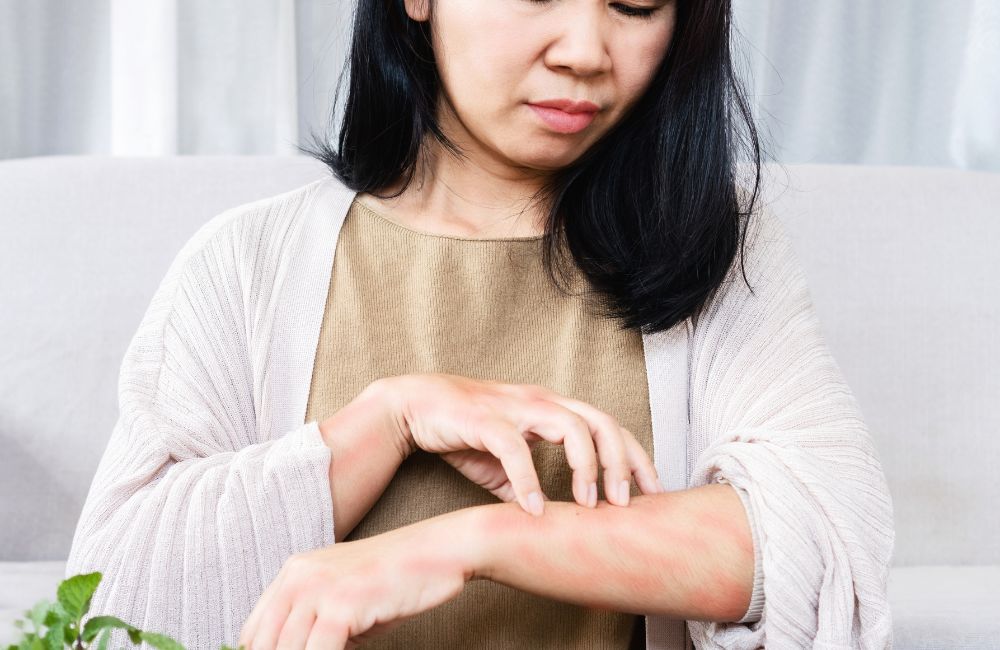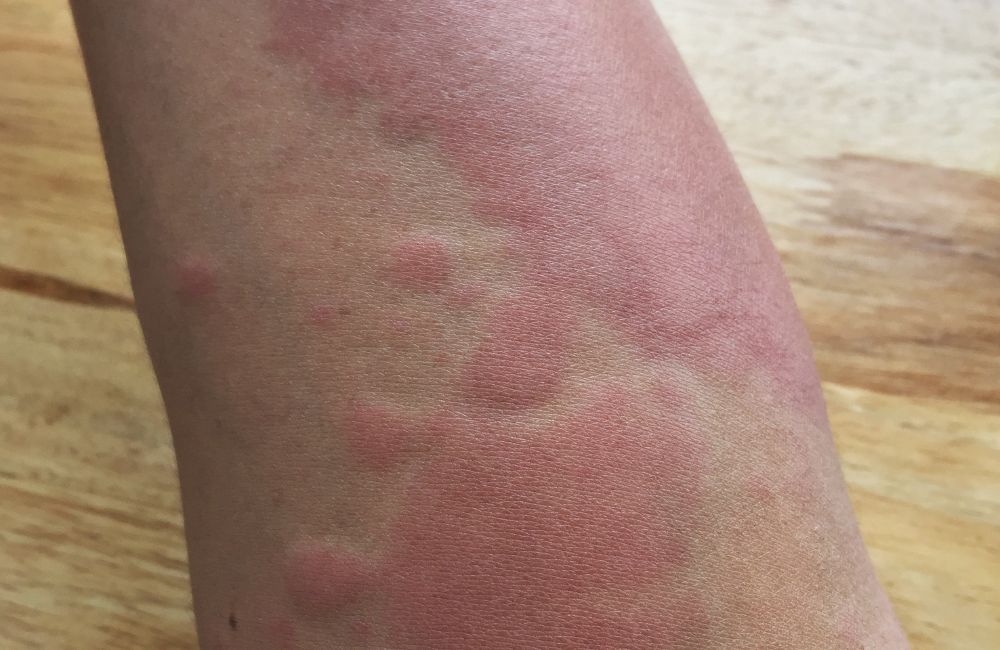
Key Takeaways
What Are Hives?
4 Ways to Treat Hives: Insights from a Primary Care Doctor in Fairfield, CT
When to Seek a Primary Care Doctor
Key Takeaways✔ Hives are red, itchy welts on the skin caused by various triggers like allergies, physical stimuli, or internal factors. ✔ Applying cold compresses, using antihistamines, maintaining a healthy lifestyle, and seeking prescription medications are effective ways to treat hives. ✔ Consult a primary care doctor if you experience severe symptoms or if hives last more than a few days or recur frequently. |
Hives, medically known as urticaria, are a common and often uncomfortable skin condition that can disrupt daily life with persistent itching and unpredictable appearance. Understanding how to effectively manage and treat hives is essential for those affected.
To help you, here are some expert tips from a local primary care doctor in Fairfield, CT, providing practical advice and medical strategies to help alleviate the discomfort of hives and improve your quality of life.
Hives, also known as urticaria, are a common skin condition characterized by red, itchy welts that appear on the skin. These welts can vary in size and shape and may appear anywhere on the body. In some cases, hives can cause swelling, especially around the eyes, lips, or throat.
There are different types of hives, each with unique characteristics:
Type of Hives | Duration | Causes |
Acute Hives | Last less than six weeks | Often caused by an allergic reaction or infection |
Chronic Hives | Last more than six weeks | Often linked to underlying health issues, such as thyroid disease or autoimmune disorders |
Physical Hives | Varies | Triggered by physical stimuli, such as pressure, temperature changes, or exercise |

Dealing with hives can be a real hassle. Thankfully, there are ways to manage and treat hives effectively. Here are some simple and practical tips to help you get relief from hives and keep them under control, shared by a primary care doctor in Fairfield, CT:
When treating hives, the first step is to identify and avoid triggers. Hives, also known as urticaria, can be caused by a variety of factors, making it essential to determine what is causing your outbreaks. Here’s a guide from a primary care doctor in Fairfield, CT, on how to effectively manage hives by recognizing and avoiding triggers.
Identifying the common triggers can help you pinpoint the cause of your hives. A primary care doctor in Fairfield, CT, might suggest monitoring the following:
A primary care doctor in Fairfield, CT, often recommends keeping a symptom diary to track what you eat, your activities, and your environment. Note when hives appear and any potential triggers you were exposed to.
Here are some steps to maintain a symptom diary:
For more precise identification, a primary care doctor in Fairfield, CT, will suggest allergy testing. This can include skin prick tests or blood tests:
Once you identify the triggers, avoiding them is crucial. Here are strategies recommended by a primary care doctor in Fairfield, CT:
If you’re dealing with hives, antihistamines are often the first line of defense recommended by a primary care doctor in Fairfield, CT. These medications are reasonably effective for treating chronic urticaria, with various studies showing a response rate of 44 to 90% by blocking the action of histamine, a substance in the body that causes allergic symptoms.
There are several types of antihistamines that a primary care doctor in Fairfield, CT might suggest:
A primary care doctor in Fairfield, CT will guide you on the proper usage of antihistamines to ensure maximum effectiveness and safety.
Using antihistamines as advised by a primary care doctor in Fairfield, CT offers several benefits:
One of the most effective and immediate treatments for hives is applying cold compresses. As recommended by a primary care doctor in Fairfield, CT, cold compresses can help reduce the discomfort and inflammation associated with hives.
Cold compresses work by constricting blood vessels and reducing blood flow to the affected area. This process helps to minimize swelling and relieve itching. According to a primary care doctor in Fairfield, CT, the cooling effect also numbs the skin, providing immediate relief from the burning and itching sensations that hives cause.
To properly apply a cold compress, follow these steps:
According to a primary care doctor in Fairfield, CT, cold compresses can be particularly beneficial in the following situations:
Maintaining a healthy diet and lifestyle is crucial in managing and preventing hives. A well-balanced diet can significantly reduce the frequency and severity of hives. Your primary care doctor in Fairfield, CT, recommends the following dietary tips:
Foods to Include:
Foods to Avoid:
Regular physical activity can improve your overall health and reduce stress, which is a known trigger for hives. Here are some exercise tips from your primary care doctor in Fairfield, CT:
Stress can exacerbate hives, so it’s essential to manage it effectively. Your primary care doctor in Fairfield, CT, suggests the following stress-reduction techniques:
Relaxation Methods:
Time Management Tips:
Proper hydration is vital for overall health and can help in managing hives. A primary care doctor in Fairfield, CT, emphasizes the importance of drinking enough water daily.

Hives can be a common and often harmless skin condition, but there are times when you should seek medical attention. Understanding when to visit a primary care doctor in Fairfield, CT, can ensure you get the right treatment and avoid complications.
If your hives are accompanied by any of the following severe symptoms, it’s crucial to see a primary care doctor in Fairfield, CT, immediately:
These symptoms can indicate a severe allergic reaction called anaphylaxis, which requires urgent medical attention.
If you notice that your hives are lasting more than a few days or keep coming back, it might be time to seek help from a primary care doctor in Fairfield, CT. Chronic hives, which persist or recur frequently, can be a sign of an underlying health issue that needs professional attention.
Persistent or recurrent hives can be caused by several factors, including:
Hives, or urticaria, are a skin condition marked by the sudden appearance of red, itchy, and raised welts on the skin. While hives are a type of rash, not all rashes are hives. A rash is a broad term for any skin outbreak and can manifest in various forms due to infections, heat, immune system disorders, or contact with irritants.
Hives can affect individuals of all ages, including children and adults. People with a history of allergies, asthma, or autoimmune disorders may be more susceptible to developing hives.
Hives are not contagious. They are usually a result of an allergic reaction or other non-contagious factors like stress, heat, or exercise. Therefore, they cannot be transmitted from one person to another through physical contact.
The duration of hives can vary. Acute hives usually resolve within a few hours to a few days. Chronic hives, which last longer than six weeks, can persist for months or even years. The time it takes for hives to go away depends on the cause and individual response to treatment.
Scratching hives does not cause them to spread, but it can exacerbate the itching and irritation. Scratching may lead to further skin damage or infection. It’s best to avoid scratching and use antihistamines or other treatments to relieve the itching.

Are you struggling with hives and looking for expert treatment? Visit Docs Primary Care – Fairfield, CT. Our experienced medical professionals are ready to provide effective solutions to help you manage and alleviate the discomfort of hives. Located conveniently in Fairfield, CT, we offer personalized care tailored to your specific needs. Don’t let hives disrupt your life any longer – schedule an appointment with Docs Primary Care – Fairfield, CT today and take the first step towards relief.



During this surge in COVID-19 cases, our primary focus is meeting the high demand for tests, and we are seeing higher than usual wait times. This means we are unable to answer most phone calls. Please know that our teams are working very hard during this time to care for as many patients as safely as possible. Please click the button below for answers to common questions. We appreciate your understanding.